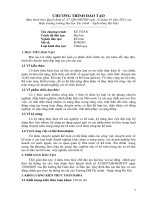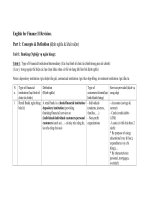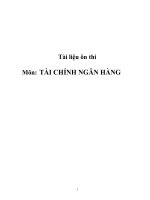NHOM 4 TIENG ANH TAI CHINH NGAN HANG 2
Bạn đang xem bản rút gọn của tài liệu. Xem và tải ngay bản đầy đủ của tài liệu tại đây (682.1 KB, 12 trang )
BỘ GIÁO DỤC VÀ ĐÀO TẠO
TRƯỜNG ĐẠI HỌC NGÂN HÀNG
Unit 19: DERIVATIVES
GVHD: Phan Thị Lệ Hoa
Nhóm 4:
1. Phùng Như Hạnh
2. Nguyễn Hà Trúc Phương
3. Mai Trung Hưng
•
•
•
•
Reading 2
Exercise 1
Exercise 2
Reading 1
Exercise 1
Exercise 2
CONTENT
EXERCISE 1
Find words and phrases in the text to complete the sentences.
put option
1. A
is a contract giving the possibility to sell a specified quantity securities, foreign exchange or
commodities in the future, if it is advantageous to do so. (para 3, line 3)
2. Commodities
are raw materials such as agricultural products and metals that traded on special exchanges. (para 2,
line 2)
3.
Futures
are forward contracts for the purchase and sale of securities, precious metals, etc. at a fixed price.
(para 2, line 1)
4. A
line 2)
call option
is a contract giving the buyer the right, but not the obligation, to buy an asset in the future (para 3,
EXERCISE 1
hedge
you make transactions that are designed to reduce risk regarding a particular price, interest
5. If you
rate or exchange rate. (para 3, line 11)
interest rate
6. An
is an exchange of future payments on borrowed money according to specified terms. (para 2,
line 7)
exericise
an
option you use or implement the option, taking up the possibility to buy or sell something.
7. lf you
(para 3, line 6)
8. A
speculator
anticipates future changes in a market and makes risky transactions, hoping to make a gain. (para
3, line 10)
9. A
premium
is the money the writer of an option receives.
(para 3, line 7)
EXERCISE 2
Use a word or phrase from each box to make word combinations from the text. You can use some words more than once. Then
use some of the word combinations to complete the sentences below.
swap
interest payments
1. Companies with fixed and floating loans can choose to
eliminate
2. Futures contracts allow you to
risks
short-term
reduce risks/ uncertaintly
;speculating is the opposite.
3. Hedging is the attempt to
options
4. If prices move the wrong way the buyers of
do not
them
determine/ guarantee prices
5. With futures, you can
several months in advance.
exercises
READING 2 – An Investment ‘time bomb
NEWS
Buffett warns on investment 'time bomb'
1. investment
2. clients
3. risk
4. instruments
Contracts devised by ‘madmen’
5. speculate
6. commodities
7. underlying
8. hedge
9. contracts
BỘ GIÁO DỤC VÀ ĐÀO TẠO
TRƯỜNG ĐẠI HỌC NGÂN HÀNG
Unit 21: asset MANAGEMENT
GVHD: Phan Thị Lệ Hoa
Nhóm 4:
1. Phùng Như Hạnh
2. Nguyễn Hà Trúc Phương
3. Mai Trung Hưng
1.READING
1. Why are people getting angry with active money managers?
Because they are not performing better than passive managers, who simply invest in indexed funds
2. Why did indexed funds develop?
Because people argued that it was impossible to consistently do better than the markets (and they wanted to take advantage of
the bull markets in the 80s and 90s)
3. What is the efficient market hypothesis?
The efficient – market hypothesis is that a company’s share price always accurately reflects all available useful information.
Further analysis will not reveal any additional information, so there is no way of knowing more than the rest of the market
participants
1.READING
4. What is George Soros’s argument against the efficient-market hypothesis?
George Soros argues that markets often over – or undervalue things, and that high and low share prices can make things
happen which in turn have an effect on prices.
5. How did Peter Lynch beat the market?
Peter Lynch found good companies that the market was undervaluing
6. Why does the article recommend that the average investor should use a passive index linked fund rather than an actively
managed one?
Because most active managers do worse than the market average, and unlike passive managers they also charge fees.
2. DIPLOMTIC LANGUAGE
Match the direct statements (1-6) with the more diplomatic phrase (a-f)
1–d
That's a bad idea!
Don't you think it would might be a good idea to...?
2–a
Completely disagree with you!
I'm not entirely sure about that.
Maybe it would be better to just transfer some of your
3–f
You can't just transfer all your funds!
funds?
4–c
That's illogical!
I'm afraid don't think that's very logical.
5–b
That'll make things worse!
6-e
You shouldn't do that!
I'm not sure that that would make things any better.
Perhaps you should consider a different investment
strategy?
BỘ GIÁO DỤC VÀ ĐÀO TẠO
TRƯỜNG ĐẠI HỌC NGÂN HÀNG
12









